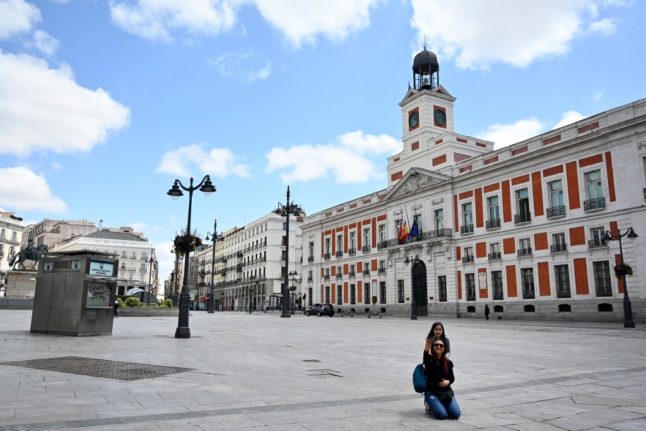National Day
Thursday October 12th is El Día de la Hispanidad (Spain’s National Day), a public holiday across Spain.
The date commemorates the so-called ‘discovery’ of the Americas by Christopher Columbus (Cristóbal Colón in Spanish).
Madrid hosts a military parade and air show every year, with smaller celebrations held elsewhere in the country.
As this year’s national day falls on a Thursday, plenty of people will take Friday off in what’s dubbed a puente (bridge) and enjoy a long weekend.
October 9th is also Valencia Day, which means that people in the eastern coastal region will enjoy two days off in one week.
READ MORE: How Spain celebrates its National Day (and why not everyone is happy about it)
October events and festivals
The party never stops in Spain and October has plenty going on. There’s Zaragoza’s famous Fiestas del Pilar, San Froilán in the Galician city of Lugo and the Moros y Cristianos (Moors and Christians) re-enactment festival in Crevillent in Alicante.
Other lesser known but equally appealing festivals are the seafood-guzzling Fiesta del Marisco in Grove in Galicia and the saffron festival of Consuegra in Castilla-La Mancha.
Socialists’ turn to try to govern
Popular Party candidate Alberto Núñez Feijóo may have won the most votes in July’s snap election, but his investiture push in late September failed, meaning he’s out of the presidential race.
This means that Spain’s King Felipe will most likely ask caretaker PM Pedro Sánchez to attempt to form a government in October.
As we’ve covered over the past few weeks, the PSOE leader will need the support of separatists groups such as Junts, whose exiled leader Carles Puigdemont has demanded amnesty for himself and those behind the illegal 2017 Catalan independence push. Expect things to get heated in October.
READ MORE: Feijóo is out of Spain’s presidential race – What will Sánchez do now?
Clocks change
The clocks will go back an hour on Sunday October 29th; at 3am Madrid time it will become 2am.
That means an extra hour in bed and less likelihood of feeling tired due to the time change.
Every year, the debate rages on in Spain and in Europe over whether daylight saving is worth keeping.
The European Parliament said 2021 would be the last year the clocks went back or forward, but in practice this never happens.
According to Spain’s BOE state bulletin, the last time Spain will change the clocks is 2026.
Changes for part-time workers
From October 1st, a part-time workday will equate to the same amount as a full-time workday, in terms of the total number of days/months/years Spaniards have to work before being able to claim a pension or access certain welfare benefits such as temporary incapacity or care of a family member.
Previously, part-time work would not count as a full day but rather a fraction based on the hours worked.
According to the Spanish social security’s website, it doesn’t matter how many hours are worked on a part-time basis on any given day for it to count as one day of work.
READ MORE: The social security changes that affect part-time workers in Spain
Two eclipses visible from Spain
On October 14th and 28th respectively, two eclipses will be partially visible from Spain.
October 14th’s eclipse will be a partial solar eclipse visible at dusk for only a few minutes. The best place to see it will be in the Canary Islands. Although the overall visibility is expected to be weak, people have been asked to not look directly at the eclipse unless they have the right eyegear on.
October 28th’s lunar eclipse will see the Earth prevent sunlight from reaching the moon, generating “a cone of shadow that obscures the moon”. It will last several hours
Madrid metro line 1 reopens
On October 14th, Madrid Metro will completely reopen its Line 1 between Valdecarros in the south and the central Sol station, after undergoing construction work since June.
The light blue line includes important stops such as Antón Martín and Atocha, and the latter’s station won’t open to Line 1 users yet due to work being done on Line 11.
Line 1 between Nueva Numancia and Sol station will be operational from September 27th.
Two more daily trains between Málaga and Spain’s big cities
Spain’s state rail provider will begin to offer two more daily AVE trains between the southern Spanish city of Málaga and the Catalan capital, starting on October 17th.
One will leave at 8.30am from the Andalusian coastal city and the other from Barcelona at 3.15pm.
That means there are now four daily trains between the two far-apart cities.
These AVE trains will pass through the Spanish capital, which essentially means that Renfe is also adding two more daily trains between Málaga and Madrid.
Flu and Covid jab campaigns across Spain
All regional authorities across Spain will kick-start their joint flu and Covid-19 vaccination campaign in early October, if they haven’t done so already in late September.
People aged 60 or over, care home and health centre residents over the age of five, high-risk under 60s, pregnant women in their third term, women who’ve just given birth, the immunosuppressed, health workers and essential workers are all advised to get their boosters.
Warm and wet weather
Spain is experiencing an Indian summer in late September, and the general consensus among meteorologists is that although the mercury won’t carry on hovering around 30C, it will be a warmer than average autumn.
They also coincide on the fact that it’ll be rainier than average, which hopefully won’t mean anything similar to the violent storms and heavy rain that’s hit Spain over the course of September.



 Please whitelist us to continue reading.
Please whitelist us to continue reading.
Member comments